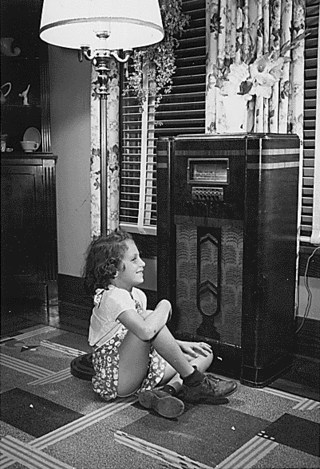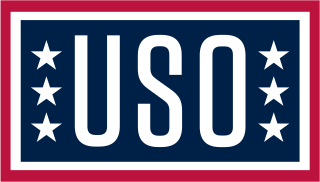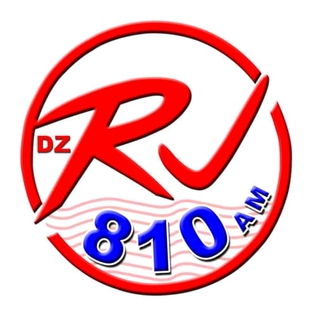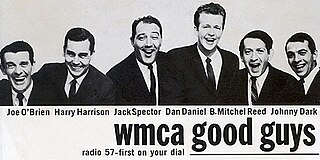Related Research Articles

The Golden Age of Radio, also known as the old-time radio (OTR) era, was an era of radio in the United States where it was the dominant electronic home entertainment medium. It began with the birth of commercial radio broadcasting in the early 1920s and lasted through the 1950s, when television gradually superseded radio as the medium of choice for scripted programming, variety and dramatic shows.

The United Service Organizations Inc. (USO) is an American nonprofit-charitable corporation that provides live entertainment, such as comedians, actors and musicians, social facilities, and other programs to members of the United States Armed Forces and their families. Since 1941, it has worked in partnership with the Department of War, and later with the Department of Defense (DoD), relying heavily on private contributions and on funds, goods, and services from various corporate and individual donors. Although it is congressionally chartered, it is not a government agency.

The American Forces Network (AFN) is a government television and radio broadcast service the U.S. military provides to those stationed or assigned overseas, and is headquartered at Fort Meade in Maryland. AFN comprises two subordinate overseas commands and one directorate in the continental United States. Overseas, AFN Europe is headquartered at Sembach Kaserne in Germany and consists of 15 subordinate stations in the countries of Bahrain, Belgium, Cuba, Germany, Greece, Italy, Spain, and Turkey. AFN Pacific is headquartered at Yokota Air Base in Japan and consists of nine stations in Diego Garcia, Japan, and South Korea. Stations under AFN Europe and AFN Pacific broadcast live local radio shows 12 hours a day Monday through Friday, with the exception of U.S. federal holidays. Stateside, AFN's broadcast operations, which include global radio and television satellite feeds, emanate from the AFN Broadcast Center/Defense Media Center at March Air Reserve Base in Riverside, California.
The Far East Network (FEN) was a network of American military radio and television stations, primarily serving U.S. Forces in Japan, Okinawa, the Philippines, and Guam.

The Military Auxiliary Radio System (MARS) is a United States Department of Defense sponsored program, established as a separately managed and operated program by the United States Army and the United States Air Force. The United States Navy-Marine Corps program closed in 2015. The program is a civilian auxiliary consisting primarily of licensed amateur radio operators who are interested in assisting the military with communications on a regional and national level when access to traditional forms of communication may no longer be available. The MARS programs also include active duty, reserve, and National Guard units; and Navy, Marine Corps units.

DZRJRadyo Bandido is a flagship AM radio station owned and operated by Rajah Broadcasting Network through its licensee Free Air Broadcasting Network, Inc. Its studio is located at the 2nd Floor, Ventures I Building, Makati Avenue corner General Luna Street, Barangay Poblacion, Makati, while its transmitter is located along Km. 21 Quirino Highway, Barangay Pasong Putik, Novaliches, Quezon City.

The BBC General Forces Programme was a national radio station operating from 27 February 1944 until 31 December 1946.

World War II was the first conflict to take place in the age of electronically distributed music.

My Little Margie is an American television sitcom starring Gale Storm and Charles Farrell that alternated between CBS and NBC from 1952 to 1955. The series was created by Frank Fox and produced in Los Angeles, California, at Hal Roach Studios by Hal Roach Jr., and Roland D. Reed.

Command Performance was a radio program which originally aired between 1942 and 1949. The program was broadcast on the Armed Forces Radio Network (AFRS) and transmitted by shortwave to overseas troops—but with few exceptions since it was not broadcast over domestic U.S. radio stations.

Martha Mears was a radio and film contralto singer, active from the 1930s to 1950s. She introduced in films original songs which have become standards, including "Long Ago ", and "My Foolish Heart".

World War II Radio Heroes: Letters of Compassion is a book by psychologist Lisa Spahr, co-authored with Austin Camacho, that recounts her personal investigation of the activities of shortwave radio listeners who notified families of captured U.S. military personnel of their status as prisoners of war during World War II. It documents Spahr's search to locate and thank the listeners who wrote letters to her great-grandmother reporting details of her grandfather's capture and internment in a German prison camp in 1943.
Blind Date is an American television game show which aired on ABC, NBC, and then DuMont after many years on radio.

Mail Call was an American radio program that entertained American soldiers from 1942 until 1945, during World War II. Lt. Col. Thomas A.H. Lewis wrote in 1944, "The initial production of the Armed Forces Radio Service was 'Mail Call,' a morale-building half hour which brought famed performers to the microphone to sing and gag in the best American manner." The program featured popular entertainers of that day, such as Bob Hope, Bing Crosby, Judy Garland, and Dinah Shore, performing musical numbers and comedy skits to boost the morale of soldiers stationed far from their homes. Lewis added, "To a fellow who has spent months guarding an outpost in the South Seas, Iceland or Africa a cheery greeting from a favorite comedian, a song hit direct from Broadway, or the beating rhythm of a hot band, mean a tie with the home to which he hopes soon to return.
Jubilee is an AFRS radio program that featured African American musicians and singers. It was broadcast to servicemen via AFRS from 1942 to 1953.
Bing Crosby was heavily involved with the Armed Forces Radio Service during World War II.

Virginia C. Claudon Allen is an American former radio personality who was a civilian employee for Army Intelligence and an American Red Cross volunteer stationed in India during World War II. She hosted a nightly radio program to counter-act the broadcasts of Tokyo Rose. Like Martha Wilkerson's GI Jive show, U.S. military and civilian officials viewed broadcasts such as Allen's for the Armed Forces Radio Service as an essential support for troop morale.

The history of radio disc jockeys covers the time when gramophone records were first transmitted by experimental radio broadcasters to present day radio personalities who host shows featuring a variety of recorded music.
GI Jill was an American disc jockey and radio host, best known for presenting program's "Jack and Jill" and GI Jive, a music program on the Armed Forces Radio Service during World War II. She was notable for her positive effect of her personality and music selections on American troops' morale and for being "universally credited with being the No. 1 overseas attraction" on AFRS. By the end of January 1945 she had made 870 broadcasts.
Chaplain Jim is an American radio war drama that began on April 20, 1942, and ended on June 30, 1946. It began on the Blue Network and later moved to the Mutual Broadcasting System.
References
- 1 2 3 Mackenzie, Harry (1999). The Directory of the Armed Forces Radio Service Series. Greenwood Press. ISBN 0-313-30812-8
- ↑ Hilmes, Michele (1997). Radio Voices: American Broadcasting, 1922-1952. University of Minnesota Press. ISBN 0-8166-2621-9
- 1 2 Bivins, Tom. World War II on the Radio. J387:Communication History document. University of Oregon.
- ↑ The Directory of the Armed Forces Radio Service Series. Greenwood Press. ISBN 0-313-30812-8
- 1 2 3 Morley, Patrick (2001). This Is the American Forces Network: The Anglo-American Battle of the Air Waves in World War II. Praeger Publishers. ISBN 0-275-96901-0
- 1 2 "Radio: G.I. Jill". Time . February 5, 1945.
- ↑ "The UK 1940s Radio Station live".